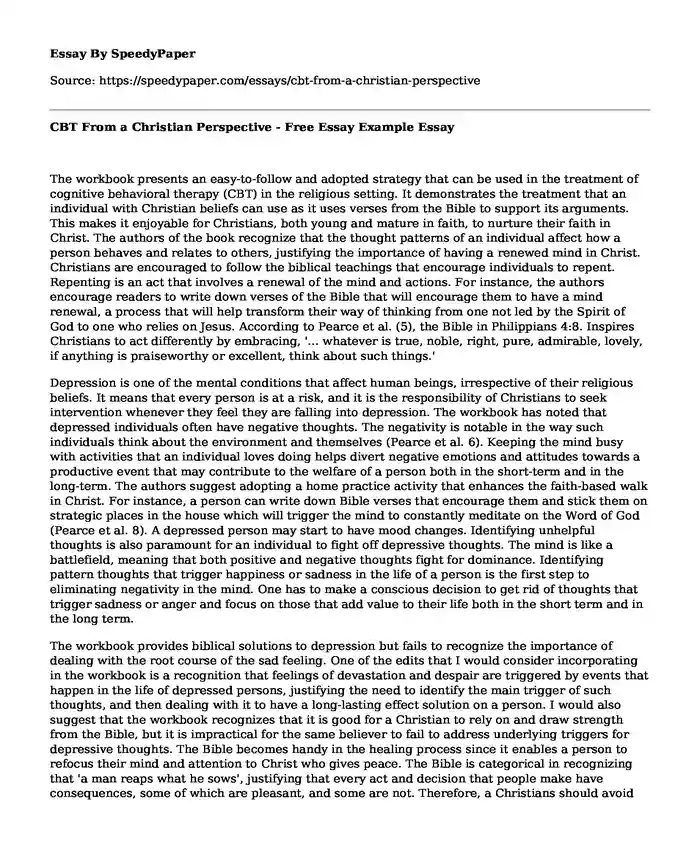
| Type of paper: | Article review |
| Categories: | Reflection Christianity Depression Human behavior Mental disorder Behavior change |
| Pages: | 3 |
| Wordcount: | 775 words |
The workbook presents an easy-to-follow and adopted strategy that can be used in the treatment of cognitive behavioral therapy (CBT) in the religious setting. It demonstrates the treatment that an individual with Christian beliefs can use as it uses verses from the Bible to support its arguments. This makes it enjoyable for Christians, both young and mature in faith, to nurture their faith in Christ. The authors of the book recognize that the thought patterns of an individual affect how a person behaves and relates to others, justifying the importance of having a renewed mind in Christ. Christians are encouraged to follow the biblical teachings that encourage individuals to repent. Repenting is an act that involves a renewal of the mind and actions. For instance, the authors encourage readers to write down verses of the Bible that will encourage them to have a mind renewal, a process that will help transform their way of thinking from one not led by the Spirit of God to one who relies on Jesus. According to Pearce et al. (5), the Bible in Philippians 4:8. Inspires Christians to act differently by embracing, '... whatever is true, noble, right, pure, admirable, lovely, if anything is praiseworthy or excellent, think about such things.'
Depression is one of the mental conditions that affect human beings, irrespective of their religious beliefs. It means that every person is at a risk, and it is the responsibility of Christians to seek intervention whenever they feel they are falling into depression. The workbook has noted that depressed individuals often have negative thoughts. The negativity is notable in the way such individuals think about the environment and themselves (Pearce et al. 6). Keeping the mind busy with activities that an individual loves doing helps divert negative emotions and attitudes towards a productive event that may contribute to the welfare of a person both in the short-term and in the long-term. The authors suggest adopting a home practice activity that enhances the faith-based walk in Christ. For instance, a person can write down Bible verses that encourage them and stick them on strategic places in the house which will trigger the mind to constantly meditate on the Word of God (Pearce et al. 8). A depressed person may start to have mood changes. Identifying unhelpful thoughts is also paramount for an individual to fight off depressive thoughts. The mind is like a battlefield, meaning that both positive and negative thoughts fight for dominance. Identifying pattern thoughts that trigger happiness or sadness in the life of a person is the first step to eliminating negativity in the mind. One has to make a conscious decision to get rid of thoughts that trigger sadness or anger and focus on those that add value to their life both in the short term and in the long term.
The workbook provides biblical solutions to depression but fails to recognize the importance of dealing with the root course of the sad feeling. One of the edits that I would consider incorporating in the workbook is a recognition that feelings of devastation and despair are triggered by events that happen in the life of depressed persons, justifying the need to identify the main trigger of such thoughts, and then dealing with it to have a long-lasting effect solution on a person. I would also suggest that the workbook recognizes that it is good for a Christian to rely on and draw strength from the Bible, but it is impractical for the same believer to fail to address underlying triggers for depressive thoughts. The Bible becomes handy in the healing process since it enables a person to refocus their mind and attention to Christ who gives peace. The Bible is categorical in recognizing that 'a man reaps what he sows', justifying that every act and decision that people make have consequences, some of which are pleasant, and some are not. Therefore, a Christians should avoid engaging in activities that will have a negative effect on their well-being or that which will affect their thoughts, rather, they are encouraged to focus and base their trust in God, whose thoughts are fixed on them (Isaiah 26:3). One of the comparative advantages of this workbook is that it can be easily adopted in different religious beliefs and practices by customizing and changing the Bible verses to Islamic, Buddhist, Judaic, or Hindu teachings. Integrating cognitive behavioral therapy in a religious setting enhances the treatment process, allowing believers of different religions to open up to their therapists.
Work Cited
Pearce, Michelle J., et al. "Religiously integrated cognitive behavioral therapy: A new method of treatment for major depression in patients with chronic medical illness." Psychotherapy 52.1 (2015): 56.
Cite this page
CBT From a Christian Perspective - Free Essay Example. (2022, Dec 16). Retrieved from https://speedypaper.net/essays/cbt-from-a-christian-perspective
Request Removal
If you are the original author of this essay and no longer wish to have it published on the SpeedyPaper website, please click below to request its removal:
- Education Essay Sample: Number of Students Enrolled in Universities
- Essay Example with the Movie Review on Hobart Shakespearean
- Essay Sample on Solitary Confinement and Mental Health in the U.S
- What is realism? Essay Example
- Essay Sample on Improving Performance Based on Analysis of Effective Communication and Behavior
- Essay Sample on Losing Weight with Self-Determination Theory (SDT)
- Mental Illness in 18th Century Prisons: A Study
Popular categories




